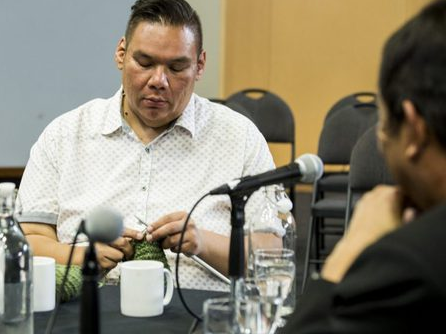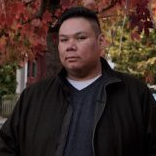 Elwood Jimmy at the PC/Cp Gathering 2017 on
Elwood Jimmy at the PC/Cp Gathering 2017 on
Lekwungen territory. Photo credit: Kirk Schwartz.
I would like to offer my gratitude to the Lekwungen People for being such gracious and generous hosts of this gathering on their territory. I would also like to thank France Trépanier and Chris Creighton-Kelly for their vision, and invitation into this process. I would also like to thank Vanessa Andreotti for her guidance in helping me clarify and refine my thoughts for this text.
Woven into the Primary Colours program were four sessions under the umbrella theme of Intersectionality in the Arts: Intergenerationality, Feminism(s), LGBTQ2S, and ColourAbility. I was asked to co-facilitate the ColourAbility session with Aruna Srivastava. Prior to the session, Aruna and I talked about how we wanted to collaboratively lead this session. We talked of the body as a foundation for the concepts we wanted to use to lead a conversation with the group that gathered. We shared some common experiences around the body, and how in different times and ways, our bodies have let us down, and how this has necessitated the ongoing negotiation of new relationships to our bodies, of a constant recalibration, and within that recalibration, mixed feelings of shame, of humility, of vulnerability, with each shift in wellness, or age, or circumstance.
I have only recently self-identified as disabled. A serious illness in 2017 landed me in the hospital for one month, followed by weeks of recovery time at home. It was only my second, part-time week back to work when I attended this gathering. Before I arrived, I had to learn how to care for this “new” body. I had to ensure that I travelled with an adequate amount of medication, and to move at the pace my body required me to move. During my hospital stay, a surgeon opened up my right thigh in three different places, and ambulatory care services had to teach me how to clean, unpack and repack the three open wounds in my leg, which I did each day while I was there. These wounds were a part of my daily life for weeks, and significantly altered my sense of (in)vulnerability and ignited a stronger sense of rigour around care and self-care. As a result of this physical trauma, I had only recently re-learned how to walk. Only a couple of weeks prior to the gathering, with great physical, mental, and emotional effort, I had been able to walk to the end of my apartment complex’s driveway and back. Several months on, this relationship with pain can still be one of frustration and sadness, but also of learning and humility and cultivating a deeper love for myself and by extension, those around me.
Part of what triggered this illness was unforeseen, but I assert that a substantial portion of this illness was by colonial design. I was born and raised in Saskatchewan, which is notoriously one of the most racist provinces in the nation we call Canada. At the time of writing this text, the sting of injustice by the acquittal of white farmer Gerald Stanley in the murder of Colten Boushie, a young Nêhiyaw man from Red Pheasant First Nation, is still fresh, as the verdict only came down two nights ago. Like Colten, I too am Nêhiyaw and come from Treaty Six. As a young adult trying to access the health care system, I was subjected to dehumanizing racialized and sexual harassment within the healthcare system. Those experiences were traumatic enough to drive me away from seeing a doctor for over a dozen years, and only after a move away from Saskatchewan to Ontario. It was only this recent personal health crisis, and some reasonably compassionate care in the hospital, that had me accessing “universal” health care regularly for the first time in my adult life. My story is not unique. Saskatchewan’s Indigenous population lags behind the rest of the country in all wellness indicators. This racially pervasive environment has also contributed to many forms of trauma that I and people like me carry, which contribute to a lack of wellness on an individual and community level.
These days, my life and work straddle many different sensibilities, communities and practices—Indigenous, Disabled, Fat, Mad, Queer/2-Spirit—all read as deficiencies and liabilities within a colonial culture and structure. But it is also from the ways of being derived from the work being produced in these communities that I draw inspiration for envisioning the world where I want my friends and peers to thrive. Within my practices now, care is a central driver and goal, and the definition of what care is shifts within each community. There is also an important distinction that Cree scholar Karyn Recollet asserted in a recent conversation, between “care” and “in care.”
Embedded within these shifts in “being” regarding care are gestures of radical learning and unlearning that are required from all of us. This sometimes creates tension and pain, but we have to constantly remind ourselves that we are in this together, and that we need to hold a space where learning, unlearning, and radical caring can happen. I struggled and hesitated to use the word privilege in this text, but it is something that we have to recognize exists within our own communities. It may seem odd to say that a group of Indigenous artists and artists of Colour are privileged or hold privilege, but in terms of gender and sexual identity, (dis)ability, and all-around proximity and access to wellness, the critique becomes more nuanced, and hierarchies emulating the colonial structure will, and do, reveal themselves. I think we are still several years away from a (dis)ability theory, practice, sensibility, and embodiment becoming embedded in the foundation of what we do, but it has to happen. My hope was that in our time together, we have planted seeds for further thought, conversations, governance, and actions around disability and care.

Elwood Jimmy is a learner, collaborator, writer, artist, facilitator, cultural manager, and gardener. He is originally from the Thunderchild First Nation, a Nêhiyaw community in the global north. For close to 20 years, he has played a leadership role in several art projects, collectives, and organizations locally and abroad. In December 2015, he was hired as the program coordinator for Musagetes, and has also commissioned texts on social injustice for its online platform ArtsEverywhere.